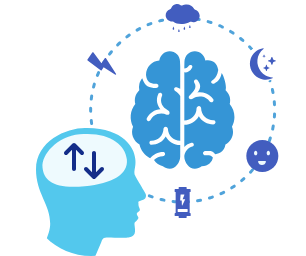Explore bipolar disorder and what your DNA can tell you
What is bipolar disorder?
Everyone experiences ups and downs in life, but bipolar disorder causes extreme changes in mood and energy called mood episodes. The highs and lows of bipolar disorder – called “mania” and “depression” – cause unusually intense emotions and changes in activity, sleep, and behavior that can make day-to-day life a challenge. People who have bipolar disorder may experience mood episodes differently. Mood episodes can vary in intensity and last days, months, or even years. Some people with bipolar disorder may have extended periods without any symptoms, or may experience mania only a few times in their life. The causes of bipolar disorder are complex and not completely understood, but they are thought to include biological differences in things like genetics and brain chemistry, as well as life experiences like very stressful events.

What are symptoms of bipolar disorder?
Mania – or a less severe form called hypomania – can come in the form of high energy, elation, irritability, and/or feeling wired, and may include other symptoms like:
- Decreased need for sleep
- Talking fast, racing thoughts, or distractibility
- Euphoria, including increased self-esteem or sense of well-being
- Impulsive behavior
Depression can cause a person to feel very down, anxious, worthless, uninterested, and/or slowed down, and may include other symptoms like:
- Sleep disturbances, like trouble falling or staying asleep or sleeping too much
- Having trouble doing simple things, concentrating, or making decisions
- Changes in appetite
- Thoughts of harming oneself, death, or suicide
In addition, bipolar disorder can cause hallucinations (seeing or hearing things) or delusions (false beliefs). If you have any concerns about symptoms, please reach out to a loved one or a healthcare professional like a primary care provider, clinical psychologist, or mental health counselor.
How common is bipolar disorder?
Although estimates vary, it’s thought that up to about 4% of people in the U.S. experience bipolar disorder in their lifetime. In the 23andMe database, about 5.7% of female research participants and 3.3% of male research participants have bipolar disorder.
Is bipolar disorder genetic?
Genetics do play a role in bipolar disorder. This means some people may be more likely to develop bipolar disorder than others, depending on their genetics. Bipolar disorder can run in families, which means that a person has an increased chance of experiencing bipolar disorder if family members have the condition. Other types of family history — including a family history of schizophrenia, depression, and autism spectrum disorder — can also increase risk for bipolar disorder. In general, the more closely genetically related a family member is, the higher the risk. In most cases, it is a combination of many different genetic variants that impact a person’s chances of experiencing bipolar disorder. Individually, each of these variants only has a small impact on a person’s genetic likelihood, but that impact can grow when many variants are considered together. 23andMe takes into account thousands of genetic markers to estimate the likelihood of being diagnosed with bipolar disorder, but keep in mind that other factors besides genetics can also influence a person’s overall likelihood of experiencing bipolar disorder.
Other factors that can increase the likelihood of bipolar disorder
Besides genetics, some factors that can increase a person’s chances of developing bipolar disorder include:
- Family history of bipolar disorder or other mental health conditions
- Stressful life experiences
- Childhood adversity or maltreatment
- Problems with alcohol, tobacco, cannabis, or other drug use
Ways to take action
Whether or not you’ve been diagnosed with bipolar disorder, a healthy lifestyle is important for your mental health. In addition, for people who have been diagnosed with bipolar disorder, maintaining a healthy lifestyle can work alongside medication and counseling to help manage symptoms and sometimes even prevent mood episodes.
- Seek social interaction and support from friends, family, or mental health professionals, especially during periods of stress or depression.
- Practice good sleep hygiene, such as sticking to a sleep schedule and avoiding screens close to bedtime. For people who have bipolar disorder, healthy sleep habits can be a first step to address problems with sleep.
- Manage stress. Try scheduling time to recharge or meditate.
- Be careful with caffeine. Consuming large amounts of caffeine, or having more than usual, can disrupt sleep and trigger manic episodes in people who already have bipolar disorder.
- Avoid alcohol, smoking, and drug use, including cannabis.
- Exercise regularly to boost mood, help alleviate stress, and promote good sleep.
- Keep a wellness journal to track your mood and habits. Noticing trends over time can help you identify symptoms, and for people who are diagnosed with bipolar disorder, can help identify triggers or see the effects of treatment. Try this one from the Depression and Bipolar Support Alliance.
If you’ve been diagnosed, don’t face bipolar disorder alone. Getting support, including talking to a healthcare professional about treatment and counseling, is an important part of care.
If you or someone you know needs support, contact the National Alliance on Mental Illness (NAMI) helpline.
Learn more about bipolar disorder from SAMHSA (Substance Abuse and Mental Health Services Administration).
What do your genes say about bipolar disorder?
The Bipolar Disorder PRS Report* can help you learn what your genetics have to say about your likelihood of being diagnosed with bipolar disorder, part of the 23andMe+ Premium membership. 23andMe+ Premium includes everything in our Health + Ancestry Service plus new premium reports and features throughout the year.

23andMe+ Premium
Please note:
- The Bipolar Disorder PRS Report* does not diagnose bipolar disorder and should not be used to make medical decisions.
- The report was developed by 23andMe scientists using data and insights gathered from thousands of customers who consent to participate in our research. Reports based on 23andMe research provide an estimate of your likelihood of developing a condition based on your genetics and other factors. This report does not account for life experiences or family history.
- The report does not account for every possible genetic variant that could affect your likelihood of developing bipolar disorder.
*The 23andMe Bipolar Disorder PRS report is based on a genetic model that includes data and insights from 23andMe consented research participants and incorporates more than a thousand genetic variants to provide information on the likelihood of developing bipolar disorder. The report does not describe a person’s overall likelihood, does not account for lifestyle or family history and has not been reviewed by the US Food and Drug Administration. The Bipolar Disorder PRS report is not intended to tell you anything about your current state of health, or to be used to make medical decisions or determine any treatment.
References:
- Harrison PJ et al. (2018). “The Emerging Neurobiology of Bipolar Disorder.” Trends Neurosci. 41(1):18-30.
- International Bipolar Foundation. “3 Stigmas About Bipolar Disorder – Debunked.” Retrieved March 12, 2024, from https://ibpf.org/3-stigmas-about-bipolar-disorder-debunked.
- International Bipolar Foundation. “Foods, Supplements and Drugs to Avoid When You Have Bipolar Disorder.” Retrieved March 12, 2024, from https://ibpf.org/articles/foods-supplements-and-drugs-to-avoid-when-you-have-bipolar-disorder/.
- Jain A et al. (2023). “Bipolar Disorder.” [Accessed March 12, 2024].
- Maggu G et al. (2023). “Cannabis use and its relationship with bipolar disorder: A systematic review and meta-analysis.” Ind Psychiatry J. 32(2):202-214.
- Mayo Clinic. “Bipolar Disorder.” Retrieved March 12, 2024, from https://www.mayoclinic.org/diseases-conditions/bipolar-disorder/symptoms-causes/syc-20355955.
- National Alliance on Mental Illness. “Bipolar Disorder.” Retrieved March 12, 2024, from https://www.nami.org/About-Mental-Illness/Mental-Health-Conditions/Bipolar-Disorder.
- National Institute of Mental Health. “Bipolar Disorder.” Retrieved March 12, 2024, from https://www.nimh.nih.gov/health/topics/bipolar-disorder.
- Preuss UW et al. (2021). “Bipolar Disorder and Comorbid Use of Illicit Substances.” Medicina (Kaunas). 57(11).
- Rowland TA et al. (2018). “Epidemiology and risk factors for bipolar disorder.” Ther Adv Psychopharmacol. 8(9):251-269.
- Scaini G et al. (2020). “Neurobiology of bipolar disorders: a review of genetic components, signaling pathways, biochemical changes, and neuroimaging findings.” Braz J Psychiatry. 42(5):536-551.